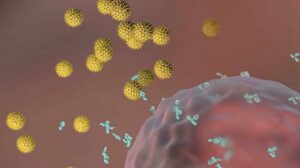Philip Goulder, a professor of immunology at the University of Oxford, is currently investigating why a significant subsection of HIV-positive children in sub-Saharan Africa seem to have resisted the virus’ progression to AIDS. These HIV non-progressors, as they are known, are unique because they most-likely contracted the virus while in the womb, a mode of transmission that has become increasingly rare as a result of intervention by PMTCT (prevention of mother-to-child transmission) programs that can reduce the likelihood of mother-to-child transmission to about 5%.
The 170 children involved in Professor Goulder’s study have low levels of CCR5, the receptor protein on the surface of CD4 T-cells. One theory is that these lower concentrations of CCR5 proteins block the virus from entering too many of the CD4 T-cells, also know as long-lived immune cells, thereby preventing the virus from slowly eradicating the body’s natural defense mechanism. Since CD4 T-cells are responsible for replenishing the short-lived immune cells, these children are able to regenerate the cells the HIV virus destroys, essentially stopping the disease from progressing to become AIDS.




